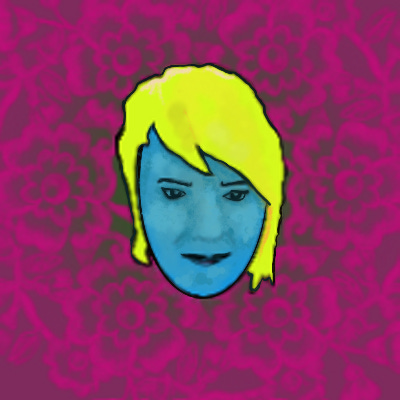Issue #8 - Jenny Stalter's Dirty Joke
Jenny Stalter’s Dirty Joke

…People are accustomed to regard anything as vulgar that overreaches their own attempts at self-justification. - Robert Penn Warren, Band of Angels.
When I began writing In Solitude, For Company I wanted to review authors and artists from the Texas Panhandle. Our area has a lot of creative types, but hasn’t been great at nurturing young talent. One of my friends phrased it succinctly as he packed his bags for Maine: “Artists around here either languish or leave.”
I’m not one to think that art–or fine art in its usual forms of music, literature, and painting–is somehow the noblest vocation, but these forms do allow us to grasp quickly what might take us years of lived experience to construct into a thought. As I’ve argued before in this newsletter, art is first about paying attention. Most of our attention is spent on what is at hand, a series of reactions to daily irritations and problems.
Therefore, paying attention to our neighbor’s art might help us make sense of our local context. As Auden said in Horae Canonicae the rooster, the artist, the judge and criminal and executioner, or each human, cries out in solitude for company. A review is responding to the cry.
A Review: Jenny Stalter’s Robin Egg Blue
Heads up: The story is definitely not safe for work, and contains graphic descriptions of sex. You’ve been warned.
Jenny Stalter mainly works in flash fiction, or stories that clock in under 1000 words. Those confines eschew the usual luxuries that authors have available like pages and pages of subtle character development. Jenny’s adaptation to the small space is to make her stories surreal, as if the drama unfolded on a Salvador Dalí landscape with melting clocks and fried eggs. Sometimes a character is a crocodile or a woman becomes a couch.
The story involves a middle-aged married couple, Luke and Jane. Luke is a burnt out rock star who never really made it. He spends his days scrubbing toilets as a janitor and singing along to the one album he made when he was young. In another story, he’d be the former high school jock who nearly made it to state. At home, he’s greeted by drunken Jane. She spends her days watching TV and funny animal videos and drinking wine.
Luke laments that Jane used to be pretty and smart and interesting. She used to be a painter. Now he has a hard time remembering if that was even true.
Their relationship is reduced to existing in each other’s space and consumption. Neither of them creates anymore. They eat sloppily, they mindlessly consume TV and pornography. Their own sex is perfunctory, entirely concerned with the self and satisfying an appetite.
The doldrum of their life is interrupted by one of Jane’s childhood memories. She discovers a robin’s egg that’s fallen from the nest, and she is shocked by the blue shell. The beauty has astonished her, and she attempts to keep the egg warm enough that it hatches. The promise of life in her hands. But she grows impatient and no robin ever emerges, so she cracks the egg open, wasting what life might have been there.
The memory is interrupted as she watches Luke eat a breakfast egg, yellow yolk dribbling from his lips. One moment before an egg had been beauty and now beauty is a thing to be consumed with slurping, wet lips. The story ends with an incredible, surreal image, that like most of Jenny’s stories, sticks in your memory.
Stories like this can work as a warning. They can slap the reader awake. Perhaps I’ll see myself as one of the characters in this story and realize how ugly I’ve become, staring through people, or living in nostalgic fantasies, or using beauty to satisfy an appetite.
Stories like these function like a gargoyle on the outside of a church. They show us our ugliness, the ways in which our lives have deformed us into monsters no one would call human. If we gaze at the gargoyle, we can acknowledge how our desires have misshaped us and work to change. This serves a good purpose, I think. Each of our lives has the potential to be tragic, like an egg fallen from the nest.
But a general complaint I have about the state of literature– at least as I’ve surveyed the landscape of stories– there are only gargoyles all the way down. Those figures are meant to be the threshold experience, not the final word. This is the experience of the harried commuter, bustling daily by Notre Dame towards his office park cubicle to fill out abstract documents. This is not the experience of the pilgrim. For a moment in Jenny’s story, when child Jane cradles the egg in her palms, she was a pilgrim. We were inside the cathedral, exposed to the radiant beauty of light and heavenly proportions. And then we’re sucked back out into the grimy street.
I wonder: if a story simply warns me, slaps me awake and tells me there’s a housefire, but doesn’t grab my hand and lead me to safety, then how helpful is it? Can a story help us imagine what a good life would look like once we’ve survived the tragedy. What’s the old saying: tragedy plus time equals comedy. Maybe I’d like a good joke, even if it’s a little dirty.
Follow Jenny on Twitter. She has another story coming out soon.
Did you like something in this issue? Maybe pass it on to someone else. Or did you despise something? Let me know by responding to the email.
I’m Seth Wieck. If you would like to read other things I’ve written, here’s a list of pieces I have published.

